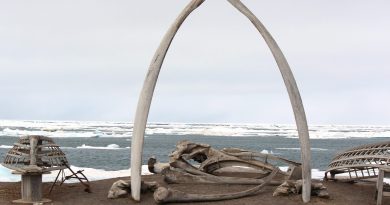Backyard barbecues and bird seed beware: bear season approaches in Canada’s Northwest Territories

Wildlife officer urges people to minimize attractants
As Yellowknifers begin emerging from the depths of winter, critters around the north are emerging too — and that’s prompting a word of warning from N.W.T. wildlife officers to be careful what you leave lying around your yard.
Backyard barbecues, bird seed and garbage are all things that can lure bears, in particular, into urban settings. Left out a bowl of pet food? It’s bear food now.
“They’ll come out hungry and curious, and some of them could be a little desperate for a food source,” explained Lee Mandeville, a renewable resources officer for the territory.
“That’s easily preventable, leaving attractants out. This is why we’re trying to work with the public, pleading with the public to help minimize those attractants and minimizing the risk to human life or property.”
He suggests not leaving garbage out, keeping your dogs leashed on trails and taking along bear deterrents if you’re going for a walk.
“A sow or mother bear can get stressed out and quite protective, so you don’t want to invade their space,” he said. “Make lots of noise — just make it well-known that you’re in the area.”
124 bears killed in 2021
The number of bear reports that require a territorial response differ widely from region to region each year. Last year, for instance, bear responses in the South Slave more than doubled to 123, up from 58 in 2020 — seven of the critters were relocated and 37 were killed.
At the same time, responses in the Beaufort Delta dropped drastically from 86 in 2020 to 29 in 2021. None were relocated or killed last year.
All 46 of the responses in the Dehcho last year resulted in animals being killed.
Mike Westwick, communications manager for the Department of Environment and Natural Resources, said 40 of those Dehcho bears were in Jean Marie River and Fort Simpson, and most had to be killed for safety reasons as residents lived in tents after the spring flood.
As for those South Slave numbers, Westwick said that’s in part due to how many calls the department received about bear sightings.
“Some communities in the region tend to see a fair number of black bears with variable numbers between years, and are cognizant of the potential for bear/human conflicts,” he wrote in an email.
The trouble with relocation
Dealing with problem bears isn’t as easy as poking them with a tranquilizer or luring them into a trap and then carting them off to a new area. That’s why preventing bears from becoming a problem in the first place is the focus for wildlife officers like Mandeville.
Relocating the creatures is a long, involved process, he explained — and a time-sensitive one, especially if they’re in more dense urban areas like Yellowknife.
“We were successful last summer with the Copper House bear — we had two bears there that were tranquilized, but we had a large team,” he said. Five officers helped with that relocation, along with wildlife techs and biologists.
“That was a long occurence, but we lucked out with that.”
They didn’t get so lucky with a bear on Tin Can Hill in September that had to be euthanized. That bear ambled over to the racquet club and then went behind someone’s home.
“We had about eight or 10 children jumping on the trampoline, unaware that there was a bear in the backyard, probably about 30 feet away,” Mandeville said.
“You know, the officer just has to act quick on it.”
Westwick said aside from the specialized equipment, training and co-ordination needed for relocation, the bear often returns to town if it’s become accustomed to eating human food and may have less fear of humans.
“With four fatalities since 1998 and numerous non-fatal, yet significant human-bear encounters over the years, we know just how dangerous that can be,” he said.
-Written by April Hudson with files from Shannon Scott
Related stories from around the North:
Canada: No photos! Put your phone down around polar bears, wildlife enforcement says, CBC News
Finland: Elk hunting season increasingly bringing hunters and joggers in same areas in Finland, Yle News
Norway: Could drones help prevent polar bear attacks on the Arctic archipelago of Svalbard?, The Independent Barents Observer
Russia: Russian Arctic town overrun by polar bears, CBC News
Sweden: Hunters push to end Sweden’s ban on bow hunting, Radio Sweden
United States: After deadly bear attack, hikers in Anchorage, Alaska weigh risks, Alaska Public Media



